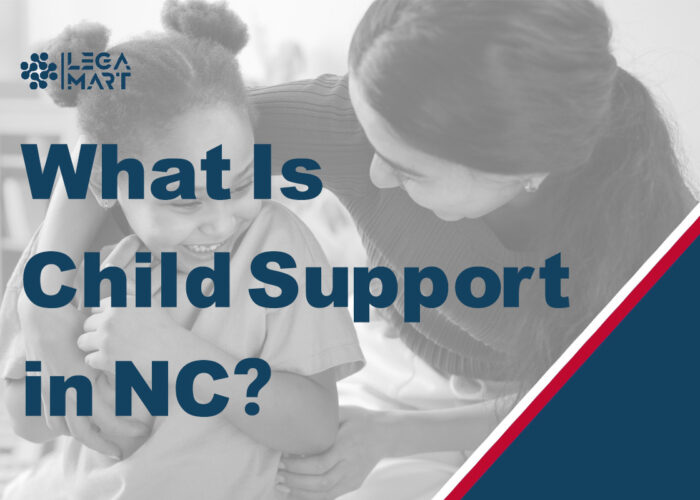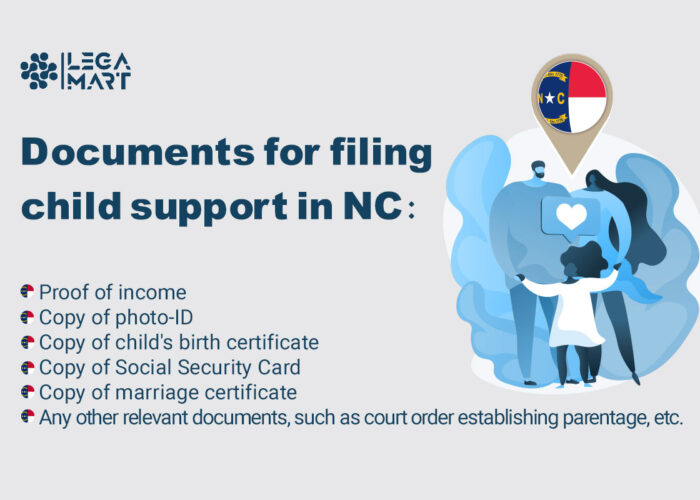Introduction
Child Custody and Child support in NC are the two major concerns after a divorce or a separation. The parent with primary custody will be responsible for maintaining the child, and all the child’s expenses will have to be suffered by the parent. Thus, it becomes essential to obtain child support to take care of the necessary expenses of the child. Child support can be a difficult and complex issue for families in North Carolina. While the state has laws to ensure that children receive the financial support they need, many families find themselves in a problematic situation regarding enforcing and collecting child support.
In North Carolina, both parents must provide child support. The child support would differ according to the circumstances of the case. The child support will include the child’s education, medical expenses, and much more. This article will explore the complexities of child support in North Carolina, including the laws and processes that must be followed to ensure that children receive the financial support they need. This article will let you know how much child support is in NC.
What is Child Support in NC?

This is a regular monthly payment made by a parent to benefit their child. Child support is made to support the daily needs of the child. Child support is made when parents are separated or not living together after a divorce or legal separation. Child support does not include emotional or mental support. Child support is usually paid by the non-custodial parent to the parent having custody of the child. It is not necessary that the parent paying the child support must have contact with the child.
Usually, it is presumed that both parents must share the child’s responsibility, so both parents must pay child support. The parent must contribute towards the child’s basic needs, such as food, clothing, shelter, health care, and education. Child support must be paid till the child reaches the age of 18. Child support varies according to the circumstances of the case. Child support is also issued in a temporary child custody order.
Ways For Child Support in NC
Child Support in NC can be arranged in several ways depending on the facts of the case. Generally, the parent who spends less time with the child is responsible for paying child support. Usually, the father is the one who ends up paying child support. The parents are not responsible for paying child support if the child becomes emancipated.
Separation Agreement
Parents can enter into a separation agreement to determine the amount of child support in NC. Everything should be mentioned in the agreement, including the decisions regarding the essential aspects of the child as well as the child’s residence. The custody of the child is also to be decided by the separation agreement. The amount mentioned in the agreement can be changed based on the court’s order.
Voluntary Support Agreement
It is an agreement voluntarily signed by the parties regarding child support. To make this agreement enforceable, it has to be signed by the judge. It is not essential that the amount mentioned in the agreement has to be based according to the child support guidelines. The child support payment method must also be mentioned in the agreement. The agreement must also mention how often the payment must be made.
Child Support Enforcement Agency
Child support petitions can also be filed with the child support enforcement agency. North Carolina Child Support Services (NCCSS) supports people who need help from a local office to gain child support and administers the North Carolina child support program under Title IV-D of the Social Security Act. NCCSS provides various functions such as the location of non-custodial parents, paternity establishment, collection of support, etc. However, NCCSS does not provide custody and visitation rights. The applicant must make the application to the NCCSS and must attach all necessary documents required for this purpose.
Documents For Filing Child Support in NC

The following documents must be provided by the applicant to NCCSS while making an application for child support in NC:
- Proof of income
- Copy of photo-ID
- Copy of child’s birth certificate
- Copy of Social Security Card
- Copy of marriage certificate
- Any other relevant documents, such as court order establishing parentage, etc.
Complaint in Court
Child support can be obtained by filing a civil complaint in court. The other party must be served with a copy of the complaint. The other party must respond to the complaint within 30 days of receiving the notice. The documents relating to the expenses of the child must be submitted to the court to obtain a child support order. The income proof must be submitted to the court for deducting the child support amount from the monthly paycheck.
If a complaint is filed for child support after executing a separation agreement, the court will provide the order based on the amount mentioned in the agreement and not according to the guidelines.
Applying for child support can be difficult. First, you need to present the case to the judge, who will determine child support based on the merits of the case. Thus it becomes crucial to know all the difficulties faced if you want to file a complaint for child support if the other party refuses to pay the child support. So you must always consult a lawyer in North Carolina who is well-versed in child support laws and can help you with all your doubts or queries regarding child support.
Legamart offers the best solution for your issues regarding child support. They have a network of excellent lawyers who can advise you on all areas of family and children law, including custodial and non-custodial parental rights. Legamart also offers the translation of various documents into several different languages. You can also get your legal queries solved through Legamart. Depending upon your requirement, you can choose a lawyer in the Legamart directory based on your requirements.
Child Support Calculation Law Table
The child support calculator will help you to determine how much child support is in NC. North Carolina Child Support Guidelines provide detailed help in calculating child support. These guidelines are based on the “income shares” model, developed under the Child Support Guidelines Project, funded by the US Office of Child Support Enforcement and administered by the National Center for State Courts. This income model will calculate the child support through the income of the parents. These guidelines will be used when the court makes a temporary or permanent child support order in child support hearings.
According to Section 50-13.4 of the North Carolina General Statutes, the Conference of Chief District Judges must provide guidelines for determining child support and review them regularly.
Several factors play an essential role in deciding child support in NC, such as the number of overnights spent by the child with the parent, monthly gross income of the parent, pre-existing child support, Child care costs, Health Insurance premiums, and extraordinary expenses such as private education.
Income
The main factor in calculating child support in NC is the income of both parents. Both parents must attach income proof while the child support is calculated. The income statement will be verified, and then the child support will be calculated.
Gross income means the income before deducting the taxes. This income means not just a salary but also includes a pension, capital gains, social security benefits, rents of property, etc. Gross income from self-employment or a business will also be considered. Reimbursements will also be included in the income if they reduce a person’s living expenses.
The court will calculate the child support based on the parent’s potential income if the parent is intentionally unemployed to avoid paying the child support. Potential income will be decided upon the parent’s assets, residence, employment potential, and probable earnings level based on the parent’s recent work history, occupational qualifications, and prevailing job opportunities.
Income is calculated by considering various sources, including but not limited to the following:
- Salaries and wages
- Commissions and bonuses
- Dividends
- Severance pay
- Ownership or operation of a business, partnership, or corporations
- Rental property income
- Retirement or pension
- Interest
- Trusts & annuities
- Workers’ compensation benefits
- Unemployment insurance benefits
- Gifts
- Prizes
- Alimony or maintenance received from any third parties.
At the same time, certain sources of income have been explicitly excluded from the calculation of gross income for child support calculation. These are:
- Adoption assistance benefits
- Benefits received from means-tested public assistance programs like Supplemental Security Income (SSI), Temporary Assistance to Needy Families (TANF), Electronic Food and Nutrition Benefits and General Assistance
- Child support payments received for any other child other than the one in the presence action.
- Social Security and Medicare contributions by the employer for the employee
- Amounts paid by any employer directly to a third party for health, disability, life insurance or retirement benefits
The court will calculate the child support based on the parent’s potential income if the parent is intentionally unemployed to avoid paying the child support. This is the process of putting income on an individual. Potential income will be decided based on the parent’s assets, residence, employment potential, and probable earnings level based on the parent’s recent work history, occupational qualifications, and prevailing job opportunities. Factors which might lead to such a possibility are:
- If you fail to exercise a reasonable capacity to earn.
- If you refuse to accept any gainful employment.
- If you deliberately avoid taking any financial responsibility.
- If you deliberately act in disregard for support obligations.
- If you deliberately depress your income.
- If you refuse to take up or continue a job.
Pre-existing Child Support
Another factor that impacts child support calculation is pre-existing child support obligations. Child support already made for other children will be deducted from the parent’s gross income.
Other Costs
Basic child support is determined using the schedule of essential child support obligations. Reasonable childcare costs include the cost of the daycare, which is to be included in calculating child support. The amount the parent pays for the child’s healthcare is also included in determining the child’s support. A minimum of $250 per child must be spent on annual uninsured medical and/or dental expenses.
Child Support Worksheets
The child support can be calculated based on the child support worksheets. The worksheet will include the income of both parents.
Worksheet A will be used if one parent has the primary physical custody of the child for whom the child support is to be calculated. The parent will have the primary physical custody of the child if the child has spent 243 nights with the parent. The child support will be calculated based on the income of both parents, but the parent who does not have primary physical custody is required to pay child support to the other parent.
Worksheet B will be used if the parents share custody of the child. Parents share custody of a child if the child lives with each parent for at least 123 nights during the year, and each parent assumes financial responsibility for the child’s expenses during the time the child lives with that parent.
Worksheet C calculates child support when primary physical custody of two or more children is split between the parents. One parent will have the primary custody of one child, and the other parent will have the primary custody of the other child.\
Health Insurance and Health Care Costs
The health insurance and health care costs are to be provided in addition to child support obligations and are divided between the parents based on their income. In case the child is covered by a family policy, the health insurance premium attributable to the child is also added for the calculation of income. However, if the exact amount is not verifiable, then the total cost of the premium is divided by the number of people covered by the policy, and thereafter, the result is multiplied by the number of covered children for whom the child support is to be determined.
The basic obligation is to provide $250 annually per child for uninsured annual medical or dental expenses. Health care coverage includes a fee for service, health maintenance organization, provider organization (preferred), and other private health insurance such as Medicaid.
Deviation from the North Carolina Child Support Guidelines
As mentioned above, these guidelines are used as rebuttable presumptions to determine child support obligations, and they are mainly based on the presumptive guidelines provided by the Conference of Chief District Judges. The reasons for deviating from the guidelines are rooted in the conclusion that, given the ability of parents to provide support, the guidelines would either not meet or exceed the child’s reasonable needs.
For parents with low incomes, there is a minimum child support obligation. When a parent required to pay child support makes less than $1,108 per month, they are obliged to pay $50 per month as child support.
High-Income Child Support
When the combined adjusted gross income of both parents exceeds $30,000 per month ($360,000 annually), the parent’s duty exceeds the guidelines for child support. When there is a high combined income, the court will determine support in an amount that will reasonably meet the child’s maintenance, education, and health needs.
Role of Parenting Time in Determining Child Support in NC
Visitation or custody time might affect North Carolina child support payments. The state calculates child support using the Income Sharing Model, which considers parents’ income and parenting time.
The Income Sharing Model provides child assistance for food, clothes, housing, and medical care. The amount each parent should pay depends on their time with the kid. More time with the kid means less child support.
North Carolina parents get overnights. The state calculates each parent’s main physical custody percentage. This proportion determines each parent’s child support. For instance, if one parent has primary physical custody 60% of the time and the other 40%, the spouse with less parenting time must pay child support.
North Carolina child support calculations include parental time. Each parent’s income and child care and medical expenditures are also considered. North Carolina’s child support system aims to provide the greatest care for children regardless of parents’ income or custody arrangements.
Amidst all this, as the parent gets child custody, it becomes difficult for the mother/father to take care of the child as now they also have to work to manage the finances. In this case, opting for childcare programs is essential. However, to ensure your child is safe and getting the right environment, you must ensure that you are only enrolling yourself in licensed childcare programs.
Two Income Models for Child Support in North Carolina

Income shares model and the percentage of income model in North Carolina
In North Carolina, two models are used to calculate child support: the income shares model and the percentage of income model. While both models take into account the income of both parents, there are some critical differences between the two.
The income shares model is used in most states, including North Carolina. Under this model, child support is based on the idea that both parents should contribute to the support of the child in proportion to their income. This means that the total cost of raising the child is divided between the parents based on their income, and each parent is responsible for paying a portion of the total cost based on their income level.
On the other hand, the percentage of income model is a simpler formula based solely on the income of the non-custodial parent. Under this model, the non-custodial parent is typically required to pay a fixed percentage of their income in child support, regardless of the income of the custodial parent or the needs of the child.
Tax Implications of Child Support in North Carolina
Child support in North Carolina has tax implications for the paying and receiving parent. Here are some important considerations:
- For the paying parent: Child support payments are not tax deductible for federal income tax purposes. The paying parent cannot deduct child support payments from their taxable income.
- For the receiving parent: Child support payments are not taxable income for federal income tax purposes. The receiving parent does not need to report child support payments as income on their tax return.
- State tax implications: North Carolina does not have a state income tax, so state tax implications do not apply.
- Dependency exemption: Before 2023, the parent who claimed the child as a dependent on their tax return was entitled to the dependency exemption, which could reduce their taxable income. However, as of 2023, dependency exemptions are no longer available, and the Child Tax Credit and Additional Child Tax Credit have replaced the exemption.
- Other tax credits: The parent with primary custody of the child may be eligible for tax credits such as the Earned Income Tax Credit (EITC) and the Child and Dependent Care Credit.
Who can Apply for Child Support?
The following persons can apply for child support in NC:
- Parents
- Legal guardian
- Social Service agency
- Non-parent caretaker
Modification of Child Support in NC
Motion to modify the child support can be made after three years of receiving the child support order. Child support can be modified if there is a change in the circumstances of the parent’s income. A difference of 15% or more of the child support paid under an existing order and the amount of child support resulting from applying the guidelines based on the parent’s current income and circumstances is presumed to be a substantial change in circumstance. Motion to modify the child support can also be made if you have lost your job and cannot provide the child support mentioned in the order.
Frequently Asked Questions
How long will child support payments have to be made?
Child support in NC has to be made till the child reaches the age of 18. If the child becomes emancipated, child support can be waived by the parents.
How is child support determined?
Child support payment is determined based on the factors in the North Carolina Child Support Guidelines. The child support payment will differ according to the type of child custody.
If I have joint child custody, do I still have to pay child support?
Yes. Even if both parents share custody of the child, child support must be paid by both parents. The child support will differ according to the time spent by the child and the parent’s income.
Who is responsible for paying child support in NC?
Both parents are responsible for supporting their children financially. However, the non-custodial parent (the parent with less parenting time) is typically required to make child support payments to the custodial parent (the parent with primary physical custody of the child).
What happens if a parent doesn’t pay child support in NC?
If a parent fails to pay child support, they can face legal consequences, such as wage garnishment, suspension of their driver’s license or professional license, and even jail time.
What expenses does child support cover in NC?
Child support is designed to cover the basic necessities of the child, such as food, clothing, shelter, and medical care. It may also cover additional expenses, such as child care or educational expenses.
Can child support orders be enforced across state lines?
Yes, child support orders can be enforced across state lines through interstate enforcement.
Can child support be paid directly to the child in NC?
No, child support payments must be made to the custodial parent, not directly to the child.
Do I need a lawyer to handle child support in NC?
While it’s not required to have a lawyer, working with an attorney with experience in family law and child support cases is generally recommended to protect your rights and interests.
Conclusion
Child support in NC is an important topic that can have a huge impact on the lives of families. It is vital for both parents to understand their rights and responsibilities regarding child support and to work together to find the best arrangement for their child. With the right information and guidance, parents can ensure their child gets the financial support they are entitled to while providing a secure and loving home environment. With appropriate knowledge and understanding, child support can be a successful source of financial security for children in North Carolina.




